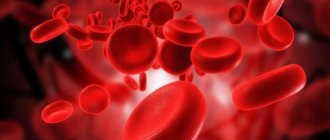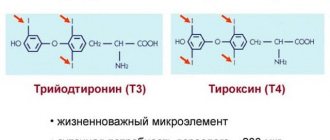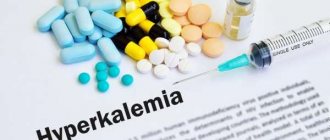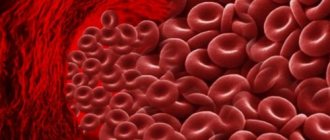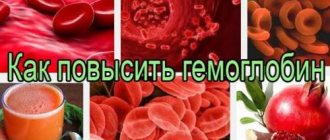High hemoglobin is not as common a problem as low hemoglobin, but it requires no less attention. An increase in the number of red blood cells has a negative impact on well-being and indicates the presence of pathological processes in the body, which means that the phenomenon must be dealt with and the sooner the better.
Hemoglobin is increased - what does this mean?
The hemoglobin protein contains iron molecules and is responsible for transporting useful substances to tissues. Its level in the blood reflects the amount of oxygen carried. High hemoglobin can be observed for various reasons, but as a rule, it becomes a manifestation of various pathologies of internal organs. An increase in protein levels is caused by a decrease in the amount of blood plasma or an overproduction of red blood cells.
Increased hemoglobin - consequences
High hemoglobin - is it good or bad - is the first question that arises in people faced with the problem. Of course, this is not normal. When the body is oversaturated with red blood cells, some systems and organs begin to function incorrectly. Increased hemoglobin causes blood to thicken. Because of this, the capillaries gradually become clogged and blood flow is disrupted, which can lead to the following consequences:
- the formation of blood clots and plaques in blood vessels;
- thromboembolism;
- gangrene;
- stroke or heart attack;
- lethal outcome.
As you can see, elevated hemoglobin protein is a serious phenomenon, but it poses a danger only if the problem is neglected and delays in contacting a specialist. Those who diagnose on time and take all necessary measures safely get rid of unpleasant symptoms, fully recover and return to normal life.
Monocytes in the blood are elevated, what does this mean? Monocytes can be elevated for a number of very dangerous reasons
Monocytes belong to leukocyte cells, the main purpose of which is to capture and neutralize foreign elements in the bloodstream. The phagocytic action of these bodies allows one to maintain the human immune defense. If monocytes are elevated, this always indicates that the body is fighting pathogenic agents.
Monocytosis: normal or pathological?
Monocytes make up from 1 to 8% of all white blood cells, but they perform extremely important functions:
- cleanse foci of inflammation from dead leukocytes, promoting tissue regeneration;
- neutralize and remove from the body cells affected by viruses and pathogenic bacteria;
- regulate hematopoiesis, help dissolve blood clots;
- break down dead cells;
- stimulate the production of interferons;
- provide antitumor effect.
A deficiency of white cells means that the body's immune status is depleted, and the person is defenseless against infections and internal diseases. But when monocytes are even moderately elevated, this almost always indicates an existing pathology. A temporary excess of the norm, which is observed in a recovered person who has recently undergone an infection, gynecological surgery, appendectomy and other types of surgical interventions, is considered acceptable.
If monocytes are elevated in an adult to 9–10%, and in a child – up to 10–15%, depending on age, it is important to establish the causes of this phenomenon. Monocytosis, in addition to a common cold, can accompany the most serious diseases.
In what diseases are monocytes elevated?
An increase in monocytes in the blood is an alarming sign. First of all, the infectious factor is excluded, as it is the most easily diagnosed. A poor leukocyte count test can be caused by viruses, fungi, intracellular parasites, and mononucleosis.
Other reasons why monocytes in the blood may be elevated are divided into several groups:
- Systemic infectious diseases: tuberculosis, brucellosis, sarcoidosis, syphilis and others.
- Blood diseases: acute leukemia, chronic myeloid leukemia, polycythemia, thrombocytopenic purpura, osteomyelofibrosis.
- Autoimmune conditions: systemic lupus erythematosus, rheumatoid and psoriatic arthritis, polyarthritis.
- Rheumatological diseases: rheumatism, endocarditis.
- Inflammations of the gastrointestinal tract: colitis, enteritis and others.
- Oncology: lymphogranulomatosis, malignant tumors.
Timely detection of an increased content of phagocyte cells plays an important role in the diagnosis of these diseases. The analysis that determines monocytosis is a reason for an in-depth examination: if you do not promptly notice that monocytes are elevated in the blood, then you may miss the development of serious complications. Including deadly conditions.
Determination of the level of monocytes in the blood
The level of monocytosis is measured in two indicators:
- absolute, demonstrating the number of cells per liter of blood, with the norm in adults up to 0.08 * 109/l, in children - up to 1.1 * 109/l;
- relative, showing whether monocytes are increased in relation to other leukocyte cells: the limit level is considered to be 12% in children under 12 years of age, and 11% in adult patients;
To check the blood for the content of monocytes, an advanced analysis is prescribed with a detailed decoding of the leukocyte formula. Donation of capillary blood (from a finger) is carried out in the morning, on an empty stomach. Drinking before the test is also not recommended.
Purulent and inflammatory processes in the body are common reasons why monocytes are elevated. If initial tests indicate that monocytes are significantly increased with a normal leukocyte count or a drop in their overall level, additional research must be carried out. Separated from other white cells, elevated monocytes are quite rare, so doctors recommend repeating the analysis after some time to exclude erroneous results. In any case, you should not decipher the analysis yourself: only a specialist can correctly interpret the resulting numbers.
High hemoglobin - reasons
The increase in blood viscosity can be permanent or temporary. What does increased hemoglobin indicate in the latter case? This problem usually occurs in people during long flights, with sudden loss of moisture, and insufficient fluid intake. Experts also call this phenomenon falsely elevated hemoglobin. It does not pose a danger, because the level of hemoprotein quickly normalizes after creating the appropriate conditions.
Chronic elevated hemoglobin has more serious causes:
- Bad habits.
Smokers experience blood thickening more often. Their bodies constantly lack oxygen, which is why they begin to actively produce red blood cells. - Life in specific conditions.
This refers to settlements located in high mountain areas. For residents of such areas, slightly elevated hemoglobin is considered normal. - Ecological situation.
Residents of areas with increased smoke and gas pollution, according to statistics, encounter the problem of blood thickening more often. By producing red blood cells, the body tries to cope with oxygen starvation. - Diseases of the cardiovascular system.
A common cause of increased hemoglobin. - Active sports.
Great physical activity requires an impressive amount of oxygen. - Specific profession.
People who are often in thin air or smoke are at risk.
High hemoglobin in women
The normal number of red blood cells is 120 – 160 g/l. Increased hemoglobin in women can be caused by the following reasons:
- Monotonous and prolonged physical activity
. With constant stress, the body requires more oxygen. - Physiological fluid loss
. If they are not compensated for, chronic elevated hemoglobin develops. - Intestinal infections
. Leading to fluid loss, a decrease in the amount of plasma in the blood and an increase in red blood cells. - Taking diuretics
. These are prescribed for kidney disease and hypertension. - Pregnancy
. High hemoglobin during pregnancy is observed, as a rule, in women who are familiar with blood clotting problems, and while taking certain vitamin complexes. - Vaquez disease
. In this case, an increase in the number of CCTs may have a malignant course. - Problems with the intestines
. Because of which the body cannot properly absorb vitamin B12.
High hemoglobin in men
The norm for the stronger sex is 130 – 170 g/l. The following factors, among others, can cause high hemoglobin levels in the blood of men:
- stress loads;
- chronic heart failure;
- diabetes;
- malignant polycythemia vera;
- stomach upsets and poisoning.
High hemoglobin in a child
Immediately after birth, hemoglobin is considered normal in the amount of 125 - 145 g/l. In the next six months, the indicators drop to 95 - 135 g/l, and then increase again. This is why a child may have increased hemoglobin:
- blood diseases;
- intestinal obstruction;
- excessive consumption of diuretic tea;
- severe burns;
- pulmonary fibrosis;
- prolonged stay in a room with dry air;
- intense sweating;
- nervous tension;
- insufficient volume of fluid consumed.
In adolescents, high hemoglobin in the blood can be observed due to frequent stress, smoking, and fever. Some young people who are actively involved in sports and regularly attend gyms suffer due to the use of anabolic steroid drugs. Vaquez-Osler disease is most often diagnosed in adults, but this disease, which causes blood thickening, can sometimes also affect children.
Etiology of the condition in men
The reasons that provoke a pathological increase in hemoglobin can be divided into two groups. The first includes the influence of external factors. They are associated with the characteristics of the habitat. These include:
- Professional characteristics (pilots and high-altitude workers may experience prolonged oxygen deficiency during work).
- Taking certain medications (for example, anabolic steroids for bodybuilding or serious hormonal medications).
- Bad habits (especially smoking cigarettes).
The influence of internal factors is another reason. These factors are associated with the peculiarities of human life processes. Namely:
- excess blood sugar (typical for diabetics);
- erythrocytosis (increased number of red blood cells) due to severe stress, kidney and cardiovascular diseases, and 2-3 degree burns;
- functional dehydration of the body;
- genetically determined increase in the amount of hemoglobin in the blood plasma;
- congenital heart pathologies;
- pulmonary failure;
- for malignant tumors;
- hypervitaminosis B12 and B9.
High hemoglobin - symptoms
Signs of a problem do not always appear. Many people do not suspect for a long time that they have increased hemoglobin in the blood, until significant changes in protein levels cause the following symptoms to appear:
- lethargy;
- increased fatigue;
- drowsiness or insomnia;
- loss of appetite;
- disturbances in the functioning of the genitourinary system;
- vision problems;
- pallor;
- itching of the skin (increased after taking a shower or bath);
- headache;
- dizziness;
- stomach ache
- increased blood pressure.
Blood hemoglobin level
Let's start with what hemoglobin is and what functions it performs in the human body. Hemoglobin is a specific blood protein containing iron that can bind to oxygen and carbon dioxide. The function of this component underlies blood circulation - the substance promotes gas exchange in human blood.
Normally, the hemoglobin content in the blood is 120-140 g/l in women, 130-160 g/l in men. Indicators below normal are considered low and contribute to the development of iron deficiency anemia. The content is 10-20 g/l more than the norm, indicating an increase in the parameter. Let's take a closer look at what high hemoglobin indicates and why it is dangerous.
High hemoglobin - what to do?
The choice of therapy should be agreed with a specialist. Small increases in protein levels can be ignored in some cases. When the deviations are serious, you should definitely and very urgently think about how to lower hemoglobin. To restore hemoprotein levels, different methods are used:
- diets;
- taking medications;
- treatment with leeches;
- folk remedies.
How to lower hemoglobin - tablets
The best way to cope with the task of lowering hemoglobin in the blood is with medications that thin the blood and restore its clotting. Such drugs include:
- Aspirin;
- Trental;
- Cardiomagnyl;
- Chime;
- Ticlopidine;
- Heparin;
- Clopidogrel and others.
How to lower hemoglobin using folk remedies?
Alternative medicine also knows how to quickly lower hemoglobin at home:
- For a long time, the most effective method was treatment with leeches. They thin the blood and normalize the amount of hemoprotein, which is why some medical centers still offer a similar procedure today.
- Mumiyo resin has earned good reviews. Traditional healers recommend taking a tablet at night for 10 days.
- To restore your hemoglobin level, you can drink 3 liters of water with lemon every day for three months in a row.
- Regular donation prevents blood clotting.
Increased hemoglobin in women
With pregnancy, it is clear that the body is trying to “not be offended” or, due to weak immunity, it is activating old chronic ailments. But what if a woman is not pregnant, and her tests are extremely unsatisfactory and alarming with high hemoglobin levels?
Again, the reason must be sought much deeper. Among the most common:
- The body’s reaction to prolonged hypoxia (the living environment has changed or the woman has suffered from anemia for a long time).
- Have diabetes, heart or lung disease.
- The patient abuses iron-containing products.
Most often, the symptoms become obvious even with an insignificant increase and it is difficult not to notice them:
- The tips of the fingers of the upper and lower extremities turn blue.
- Chronic fatigue, emotional instability, and poor appetite are observed.
- The woman is irritated by everything, she is inattentive and absent-minded.
But! Even if all these symptoms are present, the indicators differ from the norm by 10-20 units, everything can be corrected without medical intervention. Exceeds much more - long-term therapy cannot be avoided.
High hemoglobin - diet
Changing your diet will also help normalize high hemoglobin levels.
If the number of red blood cells increases, it is not recommended to eat:
- meat;
- liver;
- smoked meats;
- red vegetables and fruits;
- dishes from fast food restaurants;
- full fat milk;
- butter;
- sweet;
- buckwheat and rolled oats.
The following foods are allowed in the diet:
- lean fish;
- seafood;
- chicken;
- sour cream;
- kefir;
- green vegetables and fruits;
- legumes;
- salads.
Traditional methods
To increase the effectiveness of basic therapy and diet, traditional methods of treatment are used with the permission of the doctor. The concept of increased hemoglobin in folk recipes corresponds to thick blood or viscous blood, which is thinned using decoctions and infusions of medicinal plants.
Shilajit is considered a proven folk remedy that is used to thin the blood with elevated Hb. To prepare the medicine, 3-5 g of mumiyo are dissolved in water and drunk on an empty stomach every day. The course of treatment is 2 weeks.
- To reduce hemoglobin, weed, woodlice grass, and fireweed are used. Woodlice is added to the salad, and fireweed and fireweed leaves are brewed as herbal tea.
- Tea, decoction, and infusion of raspberry leaves thin the blood. This plant can be safely drunk as tea when Hb is elevated, adding honey to taste.
Yellow clover, horse chestnut, rose hips, valerian, burdock, lemon balm, and mulberry have properties that reduce blood viscosity. In the recipes below, the indicated volume of liquid is drunk during the day in several doses.
Recipe 1
Recipe 2
- Take equal amounts of rose hips, willow bark, St. John's wort, lavender, celandine, and valerian root;
- 150 g of collection are brewed with 1 liter of boiling water;
- leave for 2 hours;
- drink before meals;
- the course is 3 weeks.
Recipe 3
Recipe 4
Brew fireweed like tea and drink with honey, cinnamon or chamomile. To prepare tea, just brew 1 teaspoon. spoon in a glass of boiling water.
For successful treatment, you must quit smoking. This bad habit is one of the most common causes of increased hemoglobin.
And in order to correctly assess the state of health, in addition to testing for Hb in the blood, you need to take an analysis for the hemoglobin content in the erythrocyte and for the proteins transferrin and ferritin.
The level of hemoglobin in the blood of men is a variable indicator; its norm may undergo changes.
Protein levels depend on many factors, including a man's age, race, lifestyle and diet. For this reason, doctors have a certain range of indicators, deviation from it is perceived as a deviation from the norm.
Any deviation from the norm, increase or decrease in hemoglobin content in plasma leads to various health problems. May cause a disease or pathological condition. Plasma erythrocyte protein levels depend on several factors, but increases or decreases can vary within a certain range.
Minor deviations are not considered a pathology; with age, the level of protein in the plasma decreases, and its norm undergoes certain, but not dramatic changes.

